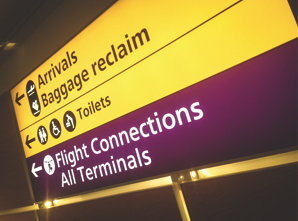Immigration: truth and justice
Struck by the negative portrayal of Romania as it became a full member of the European Union, Phil Jump reflects on the kingdom values of truth and welcome
 |
|
Photo: istockphoto.com |
New Year’s Day 2014, and had it not been for the underlying prejudices, the scene was almost comical.
A young man, who by his attire was clearly no stranger to the designer brands of the west, found himself “mobbed” in the arrivals hall of London Heathrow airport. With a mixture of indifference and bewilderment he shrugged off the attention of a frenzied media explaining he had “just come to work”.
It was a reception that more befitted an international criminal or celebrity superstar, not an ordinary guy just coming to start his new job. So why, of all the thousands arriving at the airport that day was he picked out for attention? It just so happened he was Romanian.
The power of story
In the preceding weeks, Britain had been told to brace itself for a tidal-wave of economic migrants once Bulgaria and Romania became full members of the EU, putting unprecedented strain on our already over-stretched welfare system. One report claimed that Wizz-Air had already sold 5000 one-way tickets; others spoke of entire Romanian villages preparing to uproot and relocate in our green and pleasant land. Rumour has it that in reality there were three Romanian nationals on that first flight over, two of whom had been living in the UK for ten years and had to be hastily removed from camera shot to prevent reality from spoiling the story.
The issue of immigration and the increasing racial diversity of Britain’s population is not a new one. Yet what struck me about this latest episode, was the ease with which the British media was able to so negatively portray the inhabitants of a couple of nations just a few hundred miles away from our shores. In a society where the racist insults that were sadly commonplace on the streets of my childhood, are now deemed a criminal offence, there are some, it seems, who remain “fair game”.
Remembering who we are
But what has all this to do with Baptist Christians? We might remember that Romania is home to one of the largest Unions of Baptist churches outside of the USA. Many of us prayed fervently for the “Soviet Saints” in my formative years – now the freedom for which we yearned has become a reality, the UK is being increasingly encouraged to tear down the welcome signs and buy into caricatures of migrants seeking to scrounge every last penny out of our nation’s already struggling economy.
This is a point not lost on Gale Richards, chair of our own Baptist Union’s Racial Justice committee. She reminds me that a generation ago, droves of western Christians rushed into Romania, appalled at the discovery of state orphanages whose conditions defied description – now that the children we were so keen to rescue have grown up, the narrative fuelled by UKIP, other right-wing groups and an increasingly mainstream contingent of the British press is “don’t come here.” Sadly, in some instances, it is a narrative that we have too easily allowed ourselves to join in with.
Getting to the truth
“Why would we come?” smiles Emilian Cirtina, a highly effective and much respected Romanian minister in one of our larger UK Baptist churches “The
 |
|
Emilian Cirtina |
weather is much nicer in Spain and Italy!” There is a serious side to his argument; with significant Romanian communities already resident in these two countries, and far greater similarities of language, any mass migration that did result from the relaxation of EU border controls is likely to be to there.
As someone born outside the UK, Emilian is perhaps better positioned than many to recognise the realities of British culture. He sees immigration concerns as a symptom of an increasing tendency within UK’s collective psyche to over-react to every issue that is thrown our way. “Everything here results in a panic” he notes.
It is comments like these that remind me why I am writing this piece. Our calling as a Gospel people is to not be those who simply “go with the flow” or as the Apostle Paul more eloquently expresses it “conform to the standards of this world”. This was very much the thrust of the recent publication “The lies we tell ourselves” produced by the Joint Public Issues Team of the Baptist Union along with the Methodist and United Reformed churches.
Although not so much aimed at the issue of immigration, and avoiding any particular political stance, it makes the point that an increasingly alarming amount of public opinion is formed around inaccurate and misleading statistics and anecdotes. And this is more than just a swipe at tabloid journalism, it highlights how information compiled for Government reports and policy statements can be equally misleading and one-sided.
And there is evidence, within some quarters of the Christian Church that the negativities are rubbing off on us. I was appalled to hear of one story of a Romanian couple who in the midst of personal tragedy were subjected to unspeakable racial abuse by individuals who claimed to be their sisters and brothers in Christ. Even if there is a stream of economic migrants entering our country, we might do well to remember that our Biblical bearings are intended to be set by a vision of society in which the “alien and stranger” are welcomed and provided for.
Belonging together
Tony Peck, who for many years was a Regional Minister in Yorkshire now works as secretary of the European Baptist Federation. EBF was founded shortly after the Second World War and is an important symbol to Baptist Christians of our deeper common identity in Christ, often in the face of political situations that might have suggested otherwise. He speaks of Romanians as a warm and generous hearted people, yet reminds us that this is a nation on which has been inflicted invasion, poverty, persecution and totalitarianism for most of the last half-century.
Romanian Pastor Oti Bunaciu sees this as the main reason for Romania’s enthusiasm to be part of the E.U. “This was a crucial step to a more secure future” he tells me, “we are now part of one of the most democratic unions of countries in the world.”
Baptists have good reason to celebrate Oti’s ministry; he is currently president of the EBF, and has some very different perspectives on migration. “The new multicultural situation in Europe brings with it many challenges such as: migration, poverty, human trafficking, religious conflict and growing nationalism and exclusivism in reaction. I believe that these issues can also become opportunities to minister to those in need and be witness for Jesus Christ in our world.” Oti also reminds me that Romanians have been migrating to the UK for decades, many particularly to work as doctors and pharmacists – “We rely on one of the poorest countries in Europe to train and educate them, and then one of the richest nations benefits from their skills.”
Remembering our common humanity
 |
|
Otniel Bunaciu |
Oti has also played a key role in the establishment and development of “project Ruth”, a charity that works with Roma children. This highlights another element in the current debate. Many of the news reports about migrant people have tended to confuse the Roma community with Romanians in general – whether or not this is deliberate, it underlines the importance of basing our own opinions on truth.
We do well to remember that this is a community that Amnesty International have specifically highlighted as being subject to significant persecution and discrimination. Oti comments that many of the children of the infamous orphanages were from the Roma community. There is deep gratitude for the work done by British and other European Nationals in the wake of Romania’s liberation. At the time, many expressed deep concern about how the Roma community had been marginalised and persecuted within Ceau?escu’s Romania, yet a generation on, we seem in danger of doing the same.
Pear Tree Road Baptist church in Derby is one that has a better understanding than most of the identity and presence of Roma people, around 300 Roma young people now attend a youth club at the church. Elizabeth Pinder-Ashenden, who has been minister there for just over a year, is somewhat surprised by the attention their work is generating. I caught up with her just as she finished an interview with BBC Radio Derby. The work is rooted in a simple desire to put into practice that basic Christian principle of refusing to see fellow human beings as “other”. This spirit of generosity and grace was not lost on the local Roma community, and as a result many have been attracted to the church.
An important part of its work now is to seek and encourage integration between young people particularly who come from other non-British cultures. At times this has meant actively challenging stereotypes and prejudices, but more often than not it is more straightforwardly a matter of giving people the space to share and listen to each other’s stories. “Allowing people to tell their story is crucial” she insists “so many barriers can be overcome by simply creating the opportunity for that to happen.”
In the current political climate, the issue of Britain’s place in Europe is likely to remain a significant issue in our public debate. Our response and attitude must be shaped by the values and principles of Kingdom faith, and not simply the latest exaggerations of single-issue politicians or a popularist press. For me, learning to foster and promote such attitudes strikes at the very heart of what it means to be called a Holy People.
Phil Jump is Regional Minister Team Leader of the North Western Baptist Association, and a member of the Baptist Steering Group
This article first appeared in the Summer edition of Baptists Together magazine
Baptist Times, 25/04/2014